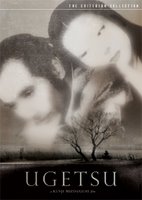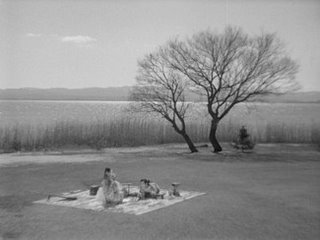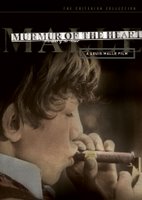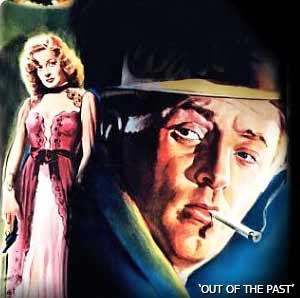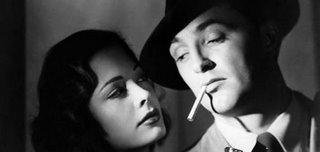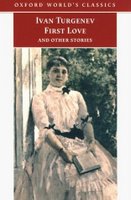 My Voyage to Italy is Martin Scorsese's four hour long paean to Italian cinema. Don't go by the length of the movie, it is hardly an encylopaedic survey, let alone even a complete and an objective one, rather it is a personal account of how movies from a particular country and culture influenced him when he was growing up and helped him become the person and filmmaker that he eventually became. Scorsese himself comes from an Italian background. His grandparents emigrated from Sicily in the 1920s and settled in a New York neighbourhood. It was there that Scorsese was born and grew up. The documentary starts with him recounting his family history and showing footage of family movies about how those Italian emigrants kept their traditions and cultures alive. And one way to keep oneself connected to the home country was the movies which used to be come on his sixteen inch TV, sometimes dubbed and sometimes on subtitles.
My Voyage to Italy is Martin Scorsese's four hour long paean to Italian cinema. Don't go by the length of the movie, it is hardly an encylopaedic survey, let alone even a complete and an objective one, rather it is a personal account of how movies from a particular country and culture influenced him when he was growing up and helped him become the person and filmmaker that he eventually became. Scorsese himself comes from an Italian background. His grandparents emigrated from Sicily in the 1920s and settled in a New York neighbourhood. It was there that Scorsese was born and grew up. The documentary starts with him recounting his family history and showing footage of family movies about how those Italian emigrants kept their traditions and cultures alive. And one way to keep oneself connected to the home country was the movies which used to be come on his sixteen inch TV, sometimes dubbed and sometimes on subtitles. 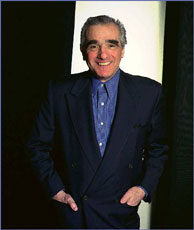 Scorsese remembers the effect the earliest neo realist films the immediate post war era had on him, specially Open City and Paisan directed by Roberto Rossellini. It is indeed not difficult to imagine what kind of effect these movies could have had on people who had grown up only on Hollywood entertainments. Actual location shootings, no make up, no close-ups, realistic framing, cast of non-professional actors telling the story filled with poverty and despair with unrelentingly and gut wrenchingly downbeat endings -- all in all complete polar opposites to glossy star-studded Hollywood entertainers. Scorsese actually even juxtaposes scenes from Open City with a few scenes from a glossy western, another genre that he used to like. Italian neorealism must surely be the most influential film movement of all time. Andre Bazin (the guru of younger cahiers du cinema critics) championed it in his writings and inspired the cinema verite movement which came to be called the french new wave. Satyajit Ray himself was inspired to make movies after watching The Bicycle Thief.
Scorsese remembers the effect the earliest neo realist films the immediate post war era had on him, specially Open City and Paisan directed by Roberto Rossellini. It is indeed not difficult to imagine what kind of effect these movies could have had on people who had grown up only on Hollywood entertainments. Actual location shootings, no make up, no close-ups, realistic framing, cast of non-professional actors telling the story filled with poverty and despair with unrelentingly and gut wrenchingly downbeat endings -- all in all complete polar opposites to glossy star-studded Hollywood entertainers. Scorsese actually even juxtaposes scenes from Open City with a few scenes from a glossy western, another genre that he used to like. Italian neorealism must surely be the most influential film movement of all time. Andre Bazin (the guru of younger cahiers du cinema critics) championed it in his writings and inspired the cinema verite movement which came to be called the french new wave. Satyajit Ray himself was inspired to make movies after watching The Bicycle Thief.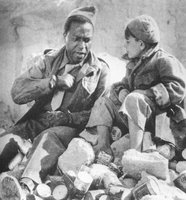 The whole documentary actually feels like a spirited defense of the neorealist film movement -- which scorsese points out is not just a genre or a style but a filmmaking philosophy, a way of looking at the world. The filmmaker Scorsese most fawns upon is Roberto Rossellini whose Open City is considered the be one of the first and certainly the most influential film of the movement. He shows extensive clips from the movie and explains why people at the time almost took it to be actual news reel footage rather something shot and staged. The film most personally affected him though was another Rossellini film called Paisan which he made not long after Open City. As a kid he was moved and terrified to see a world where kids his age and even younger had to steal and fight for survival. He shows a long clip from an episode from the movie in which an Italian kid befriends a drunk black American Soldier and when he passes out, steals his boots. After a few days he finds the kid again on the streets and demands to be taken to where the kid lives to so that he can get his boots back but when he reaches the slums he is horrified to see the condition in which people live. In another episode from the same film a teenage Italian girl helps a bunch of American soldiers to cross a mine field and falls in love with one of them only to meet a tragic end soon after. Scorsese peppers his commentary with anecdotes from his experiences of watching the film. At one place he compares the accent of his uncle's Italian with that of the American soldier speaking Italian in Paisan.
The whole documentary actually feels like a spirited defense of the neorealist film movement -- which scorsese points out is not just a genre or a style but a filmmaking philosophy, a way of looking at the world. The filmmaker Scorsese most fawns upon is Roberto Rossellini whose Open City is considered the be one of the first and certainly the most influential film of the movement. He shows extensive clips from the movie and explains why people at the time almost took it to be actual news reel footage rather something shot and staged. The film most personally affected him though was another Rossellini film called Paisan which he made not long after Open City. As a kid he was moved and terrified to see a world where kids his age and even younger had to steal and fight for survival. He shows a long clip from an episode from the movie in which an Italian kid befriends a drunk black American Soldier and when he passes out, steals his boots. After a few days he finds the kid again on the streets and demands to be taken to where the kid lives to so that he can get his boots back but when he reaches the slums he is horrified to see the condition in which people live. In another episode from the same film a teenage Italian girl helps a bunch of American soldiers to cross a mine field and falls in love with one of them only to meet a tragic end soon after. Scorsese peppers his commentary with anecdotes from his experiences of watching the film. At one place he compares the accent of his uncle's Italian with that of the American soldier speaking Italian in Paisan. Scorsese champions almost every other film made by Rossellini. With Germany Year Zero, he says, Italy seemed to have redeemed itself and regained its humanity that it had lost in the fascist period. He then goes on to defend the less well known movies that Rossellini made with Ingrid Bergman. He is all praises for Stromboli and Europa '51 and ecstatic about Voyage to Italy (that's where he takes his title too). These movies were panned by critics at the time (except the French ones) and comprehensively rejected by the audiences. The Italian critics felt that Rosselini had betrayed the working class and the neo realist movement by making melodramas which were actually Ingrid Bergman vehicles more than anything else. Scorsese tries to defend him, and succeeds too, from these criticisms. He also praises two religiously themed Rossellini pictures The Flower of St. Francis, which was about the life of a saint and his followers and The Miracle, about a simpleton woman who thinks she is pregnant with Christ. The Miracle was written by Fellini who also acted in it playing a fraudulent saint who impregnates the woman. Scorsese tries to connect the religious themes of his own movies to these movies that he saw early in his childhood.
It is a little surprising that more than half of the four hour documentary is dedicated to the career of Rosselini. The rest of the documentary is about Vittorio de Sica, Visconti, Fellini and Antonioni. He likes Shoeshine and The Bicycle Thief and I think loves Umberto D. more than the either two. He praises the skill with which de Sica directed the children. Indeed, isn't the performance by the kid in the bicycle thief the greatest performance by a kid in the film history?
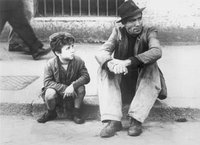 And I thought the name of the little dog in Umberto D. was Flike, not Flag as the subtitles inform us in this documentary. The Bicycle Thief is certainly my personal favourite of all. Watching the ending sequence after such a long time moved me again. It was actually the first "international art film" that I ever saw, I think it was in 99 when I was in second year of my college. It should have been in my top ten too.
And I thought the name of the little dog in Umberto D. was Flike, not Flag as the subtitles inform us in this documentary. The Bicycle Thief is certainly my personal favourite of all. Watching the ending sequence after such a long time moved me again. It was actually the first "international art film" that I ever saw, I think it was in 99 when I was in second year of my college. It should have been in my top ten too. Anyway, he then moves on to Visconti's Ossessione and La Terra Trema and shows extensive footage from the later but reserves the most effusive praises for his colour movie Senso. He calls it the "neorealism of the past" and defends it from its critics who hated its operatic style and visual opulence. He finds the story of I Vitelloni a little too close to his life and wonders what would have happened to him if he didn't "grow up" and become a filmmaker. Surprisingly he skips Nights of Cabiria and La Strada and skips directly to La Dolce Vita and tells us how its release was the highest point of Italian cinema (it still remains) in terms of awards and worldwide recognition (it won the Oscar and the Golden Palm). He then moves on the Antonioni and discusses briefly his revolutionary filmmaking style and compares him with other pioneers who experimented with the cinematic form. He also shows the spellbinding ending sequence of L'Eclisse almost in full. He ends the doc with a long discussion of 8 1/2 which he thinks has been very influential to him in the way he sees himself as a filmmaker.
Overall it is a fantastic and an exhilarating documentary. Indispensable for any movie lover and for those who are not this documentary will certainly have them converted! It is much better than the similar documentay he made on the history of American Cinema called A Personal Journey. I might need to see it again because I had seen it long back and don't remember much now. Anyway, I had hardly seen anything at the time when I saw that film. This documentary is not a text book guide, he skips many movies (Rocco and his Brothers, The Leopard, La Strada, Nights of Cabiria) and doesn't even mention Bertolucci or Pasolini but still it is very informative and very well structured. Also if you don't like endings of the movies to be revealed you may want to postpone watching it before watching the actual movies because for almost all the movies he discusses he shows the entire ending sequence in full. It really works for me even for movies which I had not seen before but can't say for everybody.
A list of Movies discussed in the documentary:
(I haven't seen any Rossellini film apart from Open City. Shoe Shine is another film I am yet to see. Even Raj Kapoor was inspired to make a gritty realistic film after watching it. He acted as a producer to the Hindi film Boot Polish. Visconti is another totally undiscovered territory too.)
Must See's by Scorsese:
Paisan by Roberto Rossellini
The Flower of St. Francis by Roberto Rossellini
Voyage to Italy by Roberto Rossellini
Umberto D. by Vittorio de Sica
Senso by Luchino Visconti
I Vitelloni by Federico Fellini
8 1/2 by Federico Fellini
Other great movies by Scorsese:
Rome Open City by Roberto Rossellini
Germany Year Zero by Roberto Rossellini
Stromboli by Roberto Rossellini
The Miracle by Roberto Rossellini
Europa '51 by Roberto Rossellini
Shoeshine by Vittorio de Sica
The Bicycle Thief by Vittorio de Sica (My Favourite)
Ossessione by Luchino Visconti
La Terra Trema by Luchino Visconti
La Dolce Vita by Federico Fellini
L'Avventura by Michelangelo Antonioni (another of my favourite)
L'Eclisse by Michelangelo Antonioni
This is a review of the documentary from The New York Times and a fine essay on The Bicycle Thief by Jim Hoberman in the village voice. This is the wiki entry on Italian neo realism. Has links to important movies.
